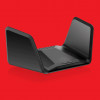Fast, Cheap Ride to Earth Orbit
At 32, Elon Musk has already launched two successful online startups. But it's on a rocket that his reputation may ultimately ride.
On Thursday, Space Exploration Technologies, or SpaceX, unveiled its seven-story Falcon orbital launch vehicle in Washington, D.C., as part of the celebrations honoring the Wright brothers' flight 100 years ago this month.
While dignitaries may wax poetic about the breakthrough at Kitty Hawk, another historic memory gnaws at Musk, the restless founder of Zip2 and co-founder of PayPal. He looks beyond the dark skies to outer space, acutely aware that this month also marks 31 years -- nearly his entire lifetime -- since the last man walked on the moon. The hefty price tag on rocket launches has profoundly limited space efforts, sidelining earlier visions of space colonies and manned exploration.
"Every other aspect of technology has improved dramatically since then," he said. "We have to get costs down; otherwise we'll remain in this stalled position ever since the end of the Apollo moon landings. That's crazy. Our long-term goal is to do some good for human access to space. It's not necessarily the biggest business in the world, but it's a good business."
Musk apparently knows a good business when he sees it. By selling his two startups (to Compaq and eBay) and making other investments, Musk amassed a fortune of $200 million. But Musk's bean counters might object that in his latest enterprise, Musk has been seduced by the lure of outer space adventure."
Musk won't be hurling himself into the void anytime soon. While other enthusiasts chase the $10 million X Prize for sending a reusable manned vehicle to the edge of the atmosphere, Musk is pragmatically focused on launching small communications satellites and other light payloads into orbit. For this purpose, his kerosene- and oxygen-fired Falcon would be the only reusable rocket on the market, apart from the aging space shuttles.









































































